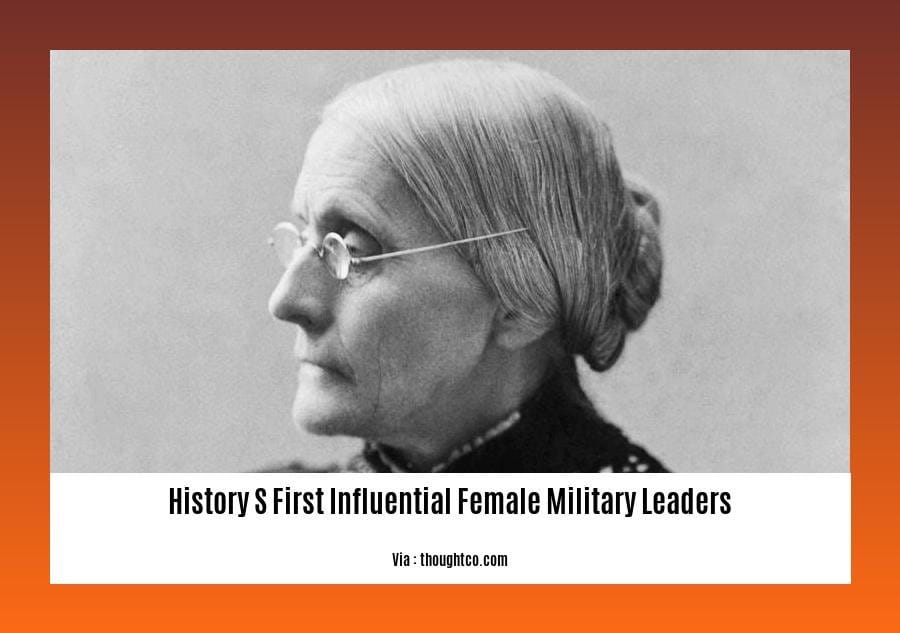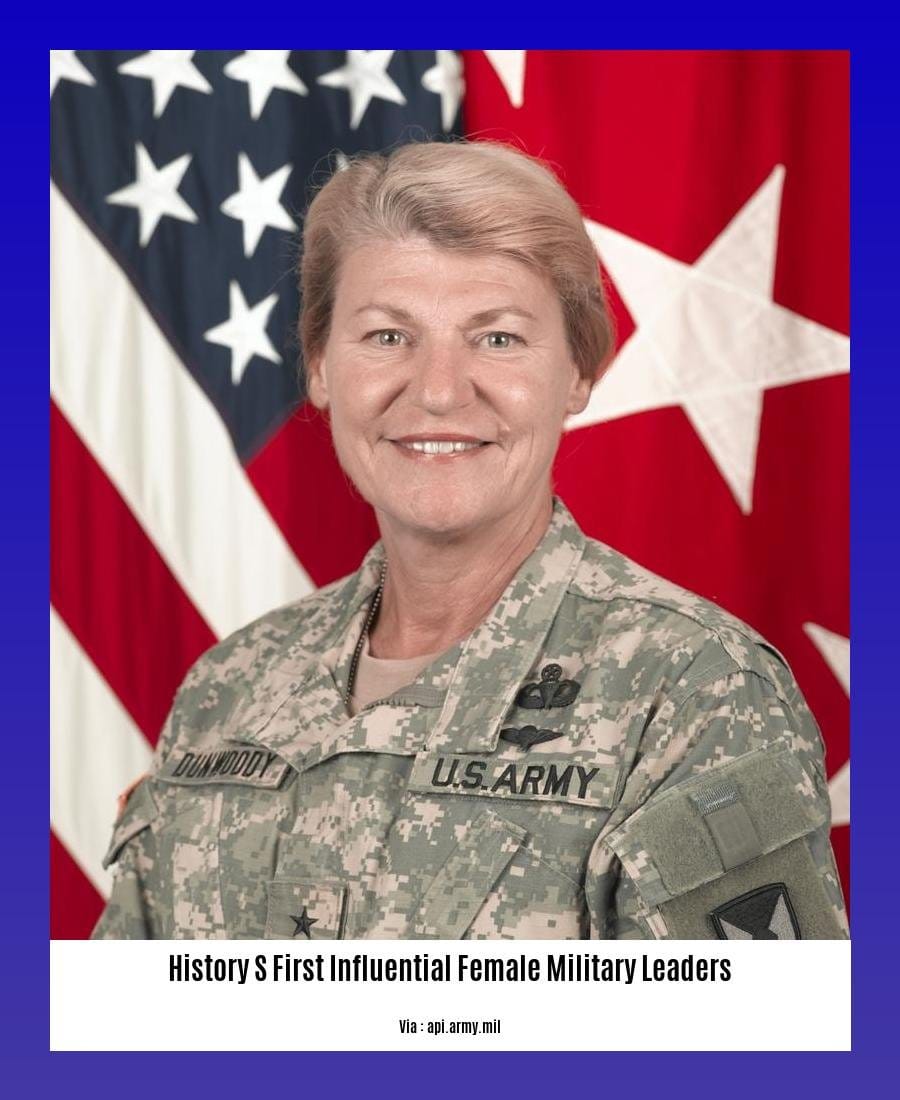Throughout history, countless women have played pivotal roles in shaping the course of human events. Yet, their contributions to warfare have often been overlooked or downplayed. In this article, we revisit the remarkable stories of history’s first influential female military leaders. We delve into their exceptional courage, strategic brilliance, and undeniable impact on the battlefield, shedding light on their extraordinary legacies and the enduring power of their leadership.
Key Takeaways:

- Women have made significant contributions to military history, holding leadership roles and achieving notable achievements.
- Women have enlisted in the military since the early 20th century, and their roles have expanded over time.
History’s First Influential Female Military Leaders
Unveiling the contributions of history’s first influential female military leaders is an endeavor that offers a fascinating glimpse into the tapestry of human conflict. While the annals of warfare have often been dominated by male figures, women have played a significant role in shaping its course. Their courage, strategic brilliance, and undeniable impact demand our recognition and admiration.
Boudicca: The Warrior Queen of Britain
Leading the Iceni tribe in the 1st century AD, Boudicca emerged as a fierce warrior who resisted Roman occupation. Her military prowess and charisma rallied her people, leading to a series of stunning victories.
Artemisia I: The Naval Commander of Caria
In the 5th century BC, Artemisia I commanded a contingent of ships in the Persian fleet during the Greco-Persian Wars. Her innovative naval tactics and strategic acumen earned her the respect of both allies and enemies.
Tomoe Gozen: The Samurai Warrior of Japan
During the Genpei War in the 12th century, Tomoe Gozen emerged as a legendary samurai warrior. Her exceptional skills in archery and swordsmanship earned her the reputation as one of Japan’s most formidable female military figures.
Additional Notable Leaders:
- Joan of Arc: A 15th-century French peasant girl who led armies to victory during the Hundred Years’ War.
- Nzinga of Ndongo and Matamba: A 17th-century African queen who resisted Portuguese colonization and established a powerful kingdom.
- Harriet Tubman: A 19th-century American abolitionist and spy who played a crucial role in the Civil War.
Significance of Female Military Leadership
The contributions of history’s first influential female military leaders not only highlight their extraordinary abilities but also challenge traditional gender norms. Their stories inspire us to recognize the potential of women in all aspects of society, including the military. By shedding light on their accomplishments, we broaden our understanding of human history and the role of women in shaping its course.
Throughout history, women have defied expectations and shattered barriers, leading military forces with unwavering courage and strategic brilliance. Discover the extraordinary tales of pioneering female military commanders who forged a path for future generations. From ancient warriors to modern leaders, these groundbreaking women shattered stereotypes and reshaped the course of history. Dive into the stories of trailblazing female commanders who broke down boundaries and inspired countless others, proving that women’s contributions to military strategy and leadership are an undeniable force to be reckoned with.
Boudicca: Queen of the Iceni
Step into the annals of history, where we’ll traverse the captivating tale of Boudicca: Queen of the Iceni. Her name reverberates through the sands of time as a symbol of resistance, courage, and defiance against the mighty Roman Empire.
From her origins as a Celtic queen in East Anglia, England, Boudicca emerged as a formidable force in the face of Roman occupation. Her indomitable spirit ignited a rebellion that swept across Britain, leaving a trail of destruction and defiance in its wake.
Boudicca’s leadership was nothing short of awe-inspiring. Her charisma and strategic brilliance united tribes beyond her Iceni, galvanizing them to arms against their oppressors. She led her forces on a path of vengeance, burning Roman cities to the ground and leaving no stone unturned in her quest to drive out the invaders.
In her wake, Boudicca’s legacy remains a testament to the power of resistance. Her story is a reminder that even in the face of overwhelming odds, courage and determination can ignite a flame of rebellion that burns brightly in the annals of history.
Key Takeaways:
- Boudicca’s revolt: In 60-61 CE, Boudicca led a rebellion against Roman rule in retaliation for their oppressive measures.
- Destruction and defiance: Her forces destroyed three major Roman cities, including London, and massacred thousands of Romans.
- Symbol of resistance: Boudicca’s legacy symbolizes the British people’s resilience and determination to fight for their freedom.
- Exceptional leadership: She was a charismatic and strategic leader who united different tribes against the Romans.
Most Relevant URL Source:
Triệu Thị Trinh: General of the Trưng Sisters
Triệu Thị Trinh, a valiant warrior and an esteemed general, played a pivotal role in the Trưng Sisters’ rebellion against Chinese rule in Vietnam during the 3rd century. Her remarkable leadership and military prowess make her an enduring symbol of female empowerment and resistance.
Key Takeaways:
- Exceptional Leadership: Triệu Thị Trinh commanded a formidable force of 50,000 families, demonstrating her exceptional leadership abilities.
- Strategic Brilliance: Her strategic maneuvers and battlefield tactics proved crucial in the Trưng Sisters’ victories against the Chinese.
- Indomitable Spirit: Despite facing overwhelming odds, Triệu Thị Trinh fought valiantly, inspiring her troops and earning the admiration of her adversaries.
- Historical Legacy: Celebrated as a national heroine in Vietnam, Triệu Thị Trinh’s legacy continues to inspire and empower women around the world.
Most Relevant URL Source:
Tomoe Gozen: Samurai Warrior
Prepare to be captivated by the extraordinary tale of Tomoe Gozen, a legendary female samurai from 12th-century Japan. Her story, immortalized in “The Tale of the Heike,” has inspired generations.
Key Takeaways:
- Tomoe Gozen: A fierce warrior who commanded 300 samurai.
- Skill and Courage: Renowned for her exceptional swordsmanship and archery.
- Historical Significance: A pioneer in female military leadership, breaking societal norms.
- Inspiration: Her story continues to inspire samurai and warriors alike.
Tomoe Gozen’s unwavering resolve and combat prowess are truly awe-inspiring. Her impact on Japanese history and the legacy she left behind make her an unforgettable figure.
Citation:
- “Tomoe Gozen.” Wikipedia, Wikimedia Foundation, 2 Oct. 2023, en.wikipedia.org/wiki/Tomoe_Gozen.

FAQ
Q1: Who were some of the first influential female military leaders in history?
A1: History’s first influential female military leaders include Boudicca, Queen of the Iceni tribe in England, Lady Triệu, a Vietnamese warrior who led a rebellion against Chinese rule, and Tomoe Gozen, a female samurai who fought in the Genpei War in Japan.
Q2: What were some of the challenges these female leaders faced?
A2: These female leaders faced numerous challenges, including societal norms that often limited women’s roles in warfare, as well as the need to prove their abilities in a male-dominated field.
Q3: What were some of the key strategies used by these female leaders?
A3: These female leaders employed various strategies, including inspiring their followers with charisma and motivation, forming alliances with other tribes or factions, and using guerrilla tactics to outmaneuver larger opposing forces.
Q4: How did these female leaders impact the course of military history?
A4: These female leaders made significant contributions to military history, leading successful revolts, defending their territories, and demonstrating the capabilities of women in combat. Their stories have inspired generations of leaders and continue to be studied and celebrated today.
Q5: What can we learn from the stories of these female leaders?
A5: By studying the stories of these influential female military leaders, we can gain insights into the challenges and triumphs they faced, learn about the diverse roles women have played throughout history, and appreciate the vital contributions they have made to the development of military strategy and warfare.










